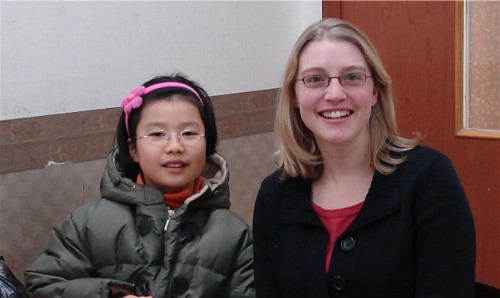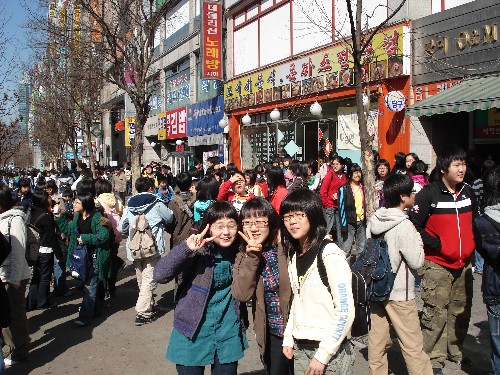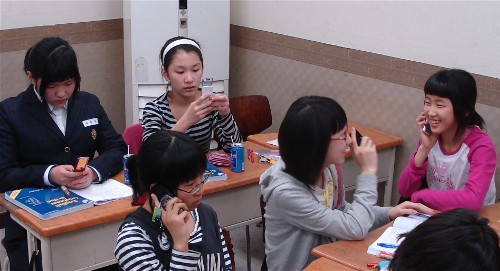We all remember the story from years back written by Dr Seuss, that most famous of children's authors: "Did I ever tell you how lucky you are?" The story tells the tale of several different characters who have it pretty bad. From Gucky Gown to the Green-bearded Schlottz or the Brothers Ba-zoo, we find out that they have one thing in common the are "muchly much-much more unlucky than you!"
There is the obvious solace that the reader can realize - knowing you may have it bad but others have it worse.
If Dr. Seuss were still around we are quite sure that he would need to amend a section in his book devoted to the plight of the Korean student.
From dawn till dusk and well beyond, Korean students study, study, study, eat something, and then study some more. |
|
The general feeling about education in Korea is two-fold. First, there is a common belief that the public school system does not adequately meet the needs of students. Second, Koreans have a burning desire to be the best, smartest and most successful in Asia (competing against their Chinese and Japanese big brothers) and achieving academic greatness is a huge component of this desire.
The bi product of these two beliefs is the hog-won or academy system. Families pay large sums of money to send their students to hog-wons to expand their knowledge in math, science, music, arts and in the case of our academy - English.
The typical day for a Korean elementary school student
(grades 4-6) goes as follows:
8:30 am Public school begins
3:30 pm Public school finishes
4:30 pm Students arrive at their academies
8:10 pm Students leave the academy for home.
9:00 pm - 10 or 11pm Students do their homework then head for bed so that they can do it all again the next morning.
Our senior students (gr. 7-9) have the same schedule except they arrive at our academy at 6:45pm and leave at 10:30pm with some of the more gifted students staying until midnight for two more special classes.
Following their day of public school (6 days a week) students come to our academy 3 days a week (either Monday, Wednesday, Friday or Tuesday, Thursday, Saturday) while the other 3 days they are at math or science academy next door at one of our school`s other academies.
 |
Jillian with one of her students |
In each of our classes we are expected to give each of our students between half and hour and an hour of homework. Multiply that by between 3 and 5 classes that they take at our academy, then compile that with homework from public school and the other academy that they attend and you can imagine the tremendous pressure and demands on these 'kids' on a daily basis.
Our academy specializes in preparing students from the Test of English as a Foreign Language (TOEFL) test - an english proficiency exam that is required by most elite high schools for admission. We teach our sr. students to practice for the speaking and writing sections of the test. In speaking class the students are required to give a 1-2 minute speech on a selected topic. In writing class students must write a 300-500 word essay also on a possible TOEFL topic.
 |
Some of our students still happy after a long day-with plenty of homework ahead |
When beginning class - we are in the habit of asking how is everyone today? In 10 months of teaching, we have yet to hear a genuine good or great! Instead all we get is bad or terrible. Constant homework leads our students to become mindless zombies who`s main task is to always get better grades. Students are given a general test every two months to assign them to a certain level. Basically the best students stay at the top and the lower students are slowly weeded out. The idea of no child left behind has been lost on the Koreans.
 |
Korean students are seldom without their cellphones |
While the students are completely overwhelmed by work, not to mention the fact that they are losing any semblance of a worry-free childhood. At the same time our compassion for these kids is dashed by the idea that our school is first and foremost a business that answers to the parents - who strangely enough want their kids to do more and more work.
After nearly a year of working in Korea, we can conclude a few things.
First, we had a great childhood and we are extremely happy for the education we received.
Second, whenever our kids complain we will just tell them be glad they are not students in Korea.
Third, children need to grow up with a slightly carefree attitude. Constant school and homework benefits very few students, but the desire to keep up with the Joneses (or the Jongs in Korea) is a far greater motivation to Korean parents.
And finally, had Dr. Seuss known about the Korean educational system, he most certainly would have devoted a couple pages to students at Hog-wons.
Nevertheless we hope this insight into school in Korea has made you folks back home realize that there are people in this world who are "muchly much-much more unlucky than you!"
But at least now you know - they live in Korea! |

